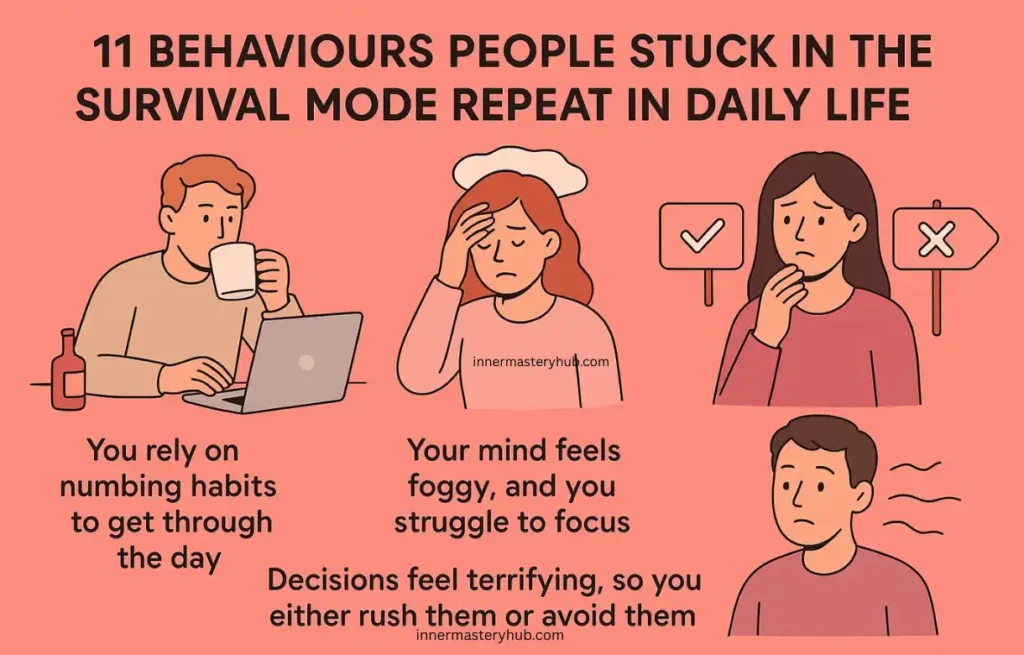5 Writing Prompts for Empaths the Secret to Emotional Protection

As an empath, you probably feel emotions deeply, not just your own, but those of others around you. It’s both a gift and a burden. You may find it exhausting to navigate the emotional landscapes of the people in your life, constantly absorbing feelings and energy, often without even realizing it.
This unique sensitivity can make it difficult to process your own emotions and find clarity in your daily life. Writing Prompts for Empaths offers a way to ground your thoughts and feelings.
The Emotional Overload Empaths Often Face
Empaths often struggle with emotional overload. According to a study published in the Journal of Personality and Social Psychology, individuals with higher empathy are more likely to experience emotional fatigue when exposed to negative emotions in others.
The problem for empaths is that this emotional sensitivity can create an overwhelming mental environment. It’s not uncommon to feel drained, confused, or even overwhelmed by the emotions of those around you.
For example, when you walk into a room where there’s tension, you may immediately feel anxious without knowing why. This constant emotional attunement can make it difficult to distinguish your own feelings from those of others, leading to confusion about which emotions are genuinely your own.
How Emotional Overload Can Affect Your Life
This constant emotional influx can impact every aspect of your life. Your relationships may feel more challenging because you’re deeply affected by others’ moods, whether positive or negative. Your work life may be disrupted as you absorb stress from colleagues or clients.
Even your physical health can be affected. The Journal of Clinical Psychology highlights how stress and emotional overload are closely linked to physical ailments like headaches, fatigue, and even chronic pain.
You might find that, by the end of the day, you’re mentally and emotionally drained, unsure of whether your exhaustion stems from your own emotions or those of others. This lack of emotional boundaries can lead to burnout, depression, and anxiety. If you’re not careful, it may even affect your sense of self.
You may start to wonder whether the emotions you’re feeling are truly your own or merely reflections of the people around you.
Writing Prompts for Empaths to Regain Emotional Clarity
Here’s where writing comes in as a solution. Journaling enables empaths to clear emotional clutter, reconnect with their authentic feelings, and establish boundaries between themselves and others. Writing Prompts for Empaths provides a safe space to process and release pent-up emotions, helping you regain your emotional clarity.
Below are five effective writing prompts for empaths, specifically designed to help you regain control over your emotions and energy:
1. “What am I feeling right now, and what emotions belong to me?”
This is one of the most important questions you can ask yourself as an empath. It helps you discern whether the emotions you’re experiencing are genuinely yours or if you’ve absorbed them from someone else.
For example, if you’re feeling anxious without reason, take a moment to reflect. Are you picking up on someone else’s anxiety? By identifying the source of these emotions, you can prevent them from overwhelming you.
Start your writing session by stating what you’re feeling at that moment. Then, ask yourself, “Is this emotion mine?” If it’s not, write down what may have triggered these feelings. The key here is to develop awareness and detach from emotions that aren’t yours, allowing you to focus on your own mental and emotional well-being.
2. “What energy am I carrying that I need to release today?”
Every empath tends to pick up on the energies of those around them. Whether it’s a friend who’s going through a tough time or a colleague who’s constantly stressed, you may unintentionally absorb their emotions. This can result in a buildup of emotional baggage that you may not even be aware of carrying.
Use this prompt to check in with yourself at the start of each day. Please write down the energies or emotions that you’ve absorbed from others, and reflect on how they affect you.
For example, you might write, “I’m carrying my partner’s stress from the argument we had last night. I need to release it.” By acknowledging these energies, you can work on releasing them through your writing and leave room for positive emotions to fill you instead.
3. “How can I protect my emotional energy today?”
As an empath, you’re constantly vulnerable to emotional energy. Whether it’s the stress of a loved one or the anxiety of a public space, your emotional energy can be drained easily. This writing prompt encourages you to establish emotional boundaries and explore ways to safeguard your well-being.
Reflect on potential situations that could drain you, and write about how you plan to manage them. For example, if you know you’ll be in a stressful meeting, you might write, “I will take deep breaths and remind myself not to absorb my colleagues’ stress.
I will protect my energy by staying focused on my own tasks.” This proactive approach to emotional self-care helps you take control of your energy.
4. “What emotions are being blocked within me, and why?”
As an empath, you may experience moments where emotions feel blocked, particularly when you’re overwhelmed by others’ feelings. This prompt encourages you to dive deeper into your emotional state and understand what’s being repressed or ignored.
For example, if you experience a sudden sense of numbness or detachment, use this prompt to explore whether you’ve suppressed certain emotions, such as anger or sadness, in response to external influences. Writing can help you identify these blocked emotions and initiate the process of releasing them healthily.

5. “What positive emotion can I invite into my life today?”
Empaths are often so focused on helping others that they forget to nurture themselves. This prompt encourages you to cultivate a mindset that invites positive emotions into your life. It’s easy to get caught in cycles of absorbing negativity, but creating space for positivity is just as important.
For example, you could write, “Today, I will invite joy into my life by practicing gratitude.” This helps shift your focus from what’s wrong to what’s right, allowing you to foster emotional growth and resilience.
Including gratitude in your daily practice also helps elevate your emotional state, making you less susceptible to the overwhelming emotions of others.
Using Writing Prompts for Empaths as a Tool for Emotional Clarity
As an empath, you may feel like you’re constantly battling emotional overwhelm. However, by incorporating these writing prompts into your daily routine, you can gain clarity, release emotional baggage, and protect your energy. Writing allows you to create emotional boundaries, ensuring that you don’t absorb more than you can handle.
Check in with yourself regularly. The key to maintaining your emotional well-being as an empath is understanding and managing your emotions, not letting them control you. The Journaling prompts for empaths listed here can help you identify, process, and release emotions in a way that benefits you, empowering you to live a more balanced, healthy life.
You are not alone in this journey. Writing Prompts for Empaths can provide a safe space and a personal tool to help you achieve the emotional release and clarity you need. Start journaling today, and watch how this simple practice can transform your emotional well-being.
Take a moment to try one of these writing prompts for empaths today. Reflect, release, and recharge your emotional energy. Let your journaling practice become your emotional anchor. If you found this article helpful, share it with other empaths you know. Together, we can create a space for emotional understanding and growth.
Frequently Asked Questions (FAQs) about Writing Prompts for Empaths
What are the best writing prompts for empaths?
Writing prompts for Empaths, such as “What am I feeling right now?” or “How can I protect my energy?” help empaths process their emotions. They enable empaths to distinguish their own feelings from those of others, achieving emotional clarity and thereby enhancing their overall mental well-being.
Why do empaths struggle with emotional overload?
Empaths experience heightened sensitivity, absorbing emotions from others. This emotional overload occurs because they lack clear boundaries, which results in stress, confusion, and exhaustion, often leading to burnout and emotional fatigue.
How can Writing Prompts for Empaths help empaths process emotions?
Writing provides a safe space for empaths to express their feelings, separate their own emotions from those of others, and release emotional baggage. This process helps them gain clarity and emotional strength, reducing stress and anxiety.
Can Journaling prompts for empaths improve emotional well-being also?
Yes, journaling helps empaths track their emotional patterns, identify absorbed energies, and release negative feelings. It offers a structured approach to protect emotional health and cultivate emotional boundaries.
How can empaths avoid absorbing others’ emotions?
Empaths can protect their energy by setting clear emotional boundaries, practicing mindfulness, and using grounding techniques. Writing Prompts for Empaths about their emotions helps differentiate their feelings from those of others and prevents emotional overload.
What emotional boundaries can empaths create?
Empaths can establish boundaries by recognizing when they are absorbing others’ emotions, setting clear limits in their relationships, and prioritizing their own self-care. Writing prompts like “What energy do I need to release?” can help reinforce these boundaries.
What is emotional fatigue for empaths?
Emotional fatigue occurs when empaths absorb excessive emotional energy from others, resulting in burnout, exhaustion, and mental fatigue. Recognizing when emotional fatigue sets in is crucial for taking preventive measures, such as journaling and self-care practices.
How do I protect my emotional energy as an empath?
To protect your emotional well-being, practice mindfulness, maintain healthy boundaries, and make time for self-reflection. Writing prompts for empaths, such as “What positive emotion can I invite today?” help reinforce this focus on self-preservation.
How does journaling help empaths?
Journaling Prompts for Empaths: A Method for Processing and Releasing Overwhelming Emotions. It enables them to track feelings, recognize external influences, and establish emotional clarity, fostering a sense of empowerment and balance.
How can empaths regain emotional clarity through these writing prompts?
Empaths can regain emotional clarity by recognizing the source of their emotions, setting boundaries, and practicing emotional release through journaling. Writing prompts for empaths help them distinguish their own feelings from those of others, promoting emotional health and inner peace.






